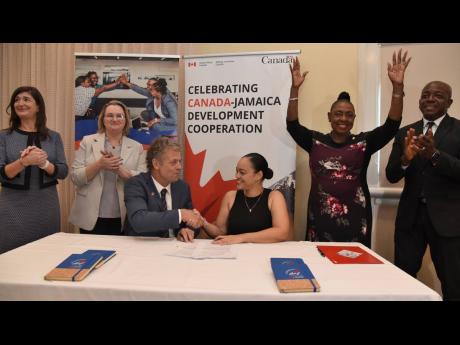LEAF enabling women and the deaf
Published:Friday | December 8, 2023 | 12:08 AMChristopher Serju/Senior Gleaner Writer
The #5 sustainable development goal (SDG) articulated by the United Nations (UN), which aims to achieve gender equality and empowerment for all women and girls by 2030, is the most important of the 17 SDGs on the UN list, according to Olivia Grange, minister of culture, gender, entertainment and sports.
“This is the most important goal which requires all countries to put in place measures to ensure that women and girls are fully protected. It is non-negotiable,” she told yesterday’s grant-signing ceremony of the Local Engagement and Action Fund (LEAF) at the Courtyard by Marriott in St Andrew.
Describing the partnership between the governments of Canada and Jamaica as unique, Grange said it facilitates the recognition and promotion of entrepreneurship as an invaluable and practical path to independence and autonomy.
According to the UN, women and girls, everywhere, must have equal rights and opportunity and be able to live free of violence and discrimination. It goes further to state that gender equality by 2030 requires urgent action to eliminate the many root causes of discrimination that still curtail women’s rights in private and public spheres.
“For example, discriminatory laws need to change and legislation adopted to proactively advance equality. Yet, 49 countries still lack laws protecting women from domestic violence, while 39 bar equal inheritance rights for daughters and sons. Eliminating gender-based violence is a priority, given that this is one of the most pervasive human rights violations in the world today. Based on data from 87 countries, one in five women and girls under the age of 50 will have experienced physical and/or sexual violence by an intimate partner within the last 12 months. Harmful practices, such as child marriage, steal the childhood of 15 million girls under age 18 every year,” it points out.
The Bureau of Gender Affairs, the Clarendon Parish Development Committee Benevolent Society and the Jamaica Association for the Deaf (JAD) were the three organisations selected to receive grants from the 90 Jamaican applicants who answered the call for proposals.
Sylvie Bedard, director general, Central America and the Caribbean, Global Affairs Canada, pointed out that this year’s LEAF projects will focus on two themes supporting the realisation of human rights of individuals with disabilities, as well as youth engagement. She offered some insight into the organisations which had successfully undergone a rigorous review programme process.
The Bureau of Gender Affairs is slated to implement a women’s entrepreneurship support project with the aim of helping women with disabilities start and sustain their businesses. Its overall goal is to empower and promote the income-making inclusion of 25 women with disabilities by providing them with the necessary tools, skills and support to become successful entrepreneurs.
The Clarendon Parish Development Committee Benevolent Society will seek to empower 30 at-risk youths for economic success, addressing youth crime and violence by training the youngsters in business development and life skills.
Empowering Deaf Community Stakeholders is the name of the project that will be undertaken by the Jamaica Association for the Deaf, which will seek to engage stakeholders islandwide on disability rights and whose activities will include an inter-school competition and science fair among schools for the deaf.
OPPORTUNITY FOR IMPROVEMENT
JAD Executive Director Kimberley Marriott-Blake told The Gleaner that the grant will provide an opportunity to improve the organisation for greater sustainability which would enable it to compete in a better way and to meet a lot of the needs of its members. The JAD operates schools in four parishes from the pre-school through to the secondary education level.
“It’s amazing opportunity on one hand to boost our organisation and to improve ourselves as a team and as a national organisation for the deaf and also to support our students across the island with hearing loss to be in a better position to take on the post-secondary opportunities. Also, it will allow us to engage in a way that our students don’t necessarily get to do very often,” she explained.
“The project will help us to streamline a lot of our efforts so that we can be stronger together. The development of our students is important and oftentimes they don’t have that opportunity to engage in inter-school activities, which is something that is quite common at the high-school level across our islands. And so our inter-school science fair becomes an amazing opportunity for our students to show their skills; to show to us what they’ve learnt; to really pick their brain and to kinda propel them into the 21st century of learners and hopefully to see them go on to STEM careers.”
Their project will start in January and run until the end of 2024.

